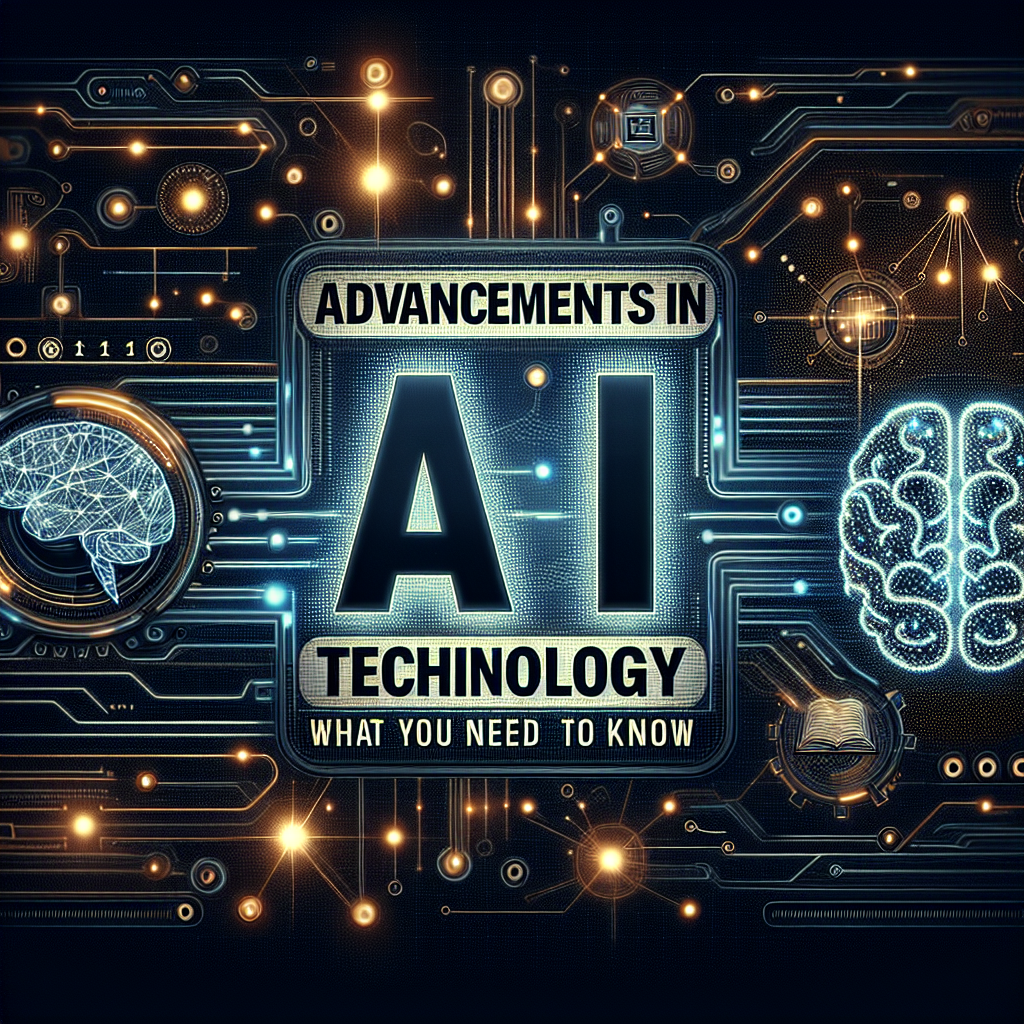Artificial intelligence (AI) technology has rapidly evolved in recent years, transforming various industries and impacting our daily lives. From virtual assistants to self-driving cars, AI has the potential to revolutionize the way we live and work. In this article, we will explore the latest advancements in AI technology and what you need to know about its implications.
The Rise of AI
AI technology has gained significant momentum in recent years, with advancements in machine learning, natural language processing, and computer vision. These technologies have enabled AI systems to perform complex tasks that were once thought to be exclusive to human intelligence. From Google’s AlphaGo defeating world champions in the game of Go to virtual assistants like Amazon’s Alexa and Apple’s Siri, AI has become an integral part of our daily lives.
Applications of AI
AI technology is being used across various industries, including healthcare, finance, transportation, and entertainment. In healthcare, AI is being used to diagnose diseases, personalize treatment plans, and predict patient outcomes. In finance, AI algorithms are being used to analyze market trends, detect fraud, and optimize investment portfolios. In transportation, AI is powering self-driving cars, drones, and smart traffic management systems. In entertainment, AI is being used to personalize content recommendations, create realistic virtual worlds, and enhance gaming experiences.
Implications of AI
While AI technology holds great promise for improving efficiency, productivity, and convenience, it also raises concerns about job displacement, data privacy, and ethical implications. The rise of automation and AI-powered technologies may lead to job loss in certain industries, requiring individuals to acquire new skills and adapt to the changing workforce. Additionally, the mass collection and analysis of data by AI systems raise concerns about privacy, security, and the potential misuse of personal information. Ethical considerations, such as bias in AI algorithms and the accountability of AI systems, also need to be addressed to ensure the responsible development and deployment of AI technology.
Recent Advancements in AI
Recent advancements in AI technology have pushed the boundaries of what is possible with machine learning, deep learning, and other AI techniques. Researchers have developed AI systems that can generate realistic human-like text, compose music, create art, and even play video games at professional levels. Breakthroughs in natural language processing have resulted in AI models that can understand and generate language with remarkable accuracy and fluency. AI-powered medical imaging systems have shown the potential to improve diagnosis and treatment in healthcare. Self-driving cars have become more sophisticated and safer, with companies like Tesla, Waymo, and Uber investing heavily in autonomous vehicle technology.
Future of AI
The future of AI technology holds endless possibilities, with advancements in quantum computing, robotics, and augmented reality shaping the next wave of innovation. Quantum computers have the potential to solve complex problems at speeds unimaginable with traditional computers, revolutionizing fields like drug discovery, weather forecasting, and cryptography. Robotics technology is advancing rapidly, with AI-powered robots being developed for a wide range of applications, from healthcare and manufacturing to agriculture and space exploration. Augmented reality technology is blurring the line between the physical and digital worlds, enabling immersive experiences in education, entertainment, and commerce.
Conclusion
AI technology is a powerful force that is reshaping the way we live and work. From healthcare to finance to entertainment, AI has the potential to revolutionize industries and improve our quality of life. However, the ethical, social, and economic implications of AI must be carefully considered to ensure that its benefits are maximized while minimizing its risks. As AI technology continues to advance, it is essential for policymakers, businesses, and individuals to collaborate on developing responsible AI solutions that promote innovation and human well-being.
FAQs
What is artificial intelligence (AI)?
Artificial intelligence (AI) is a branch of computer science that focuses on creating intelligent machines that can perform tasks that typically require human intelligence, such as learning, reasoning, problem-solving, perception, and language understanding.
What are some examples of AI technology?
Some examples of AI technology include virtual assistants (e.g., Siri, Alexa), self-driving cars, recommender systems (e.g., Netflix recommendations), image recognition systems, and natural language processing (e.g., language translation).
What are the implications of AI technology?
The implications of AI technology include job displacement, data privacy concerns, ethical considerations (such as bias in algorithms), and the potential for misuse of AI systems. However, AI also has the potential to improve efficiency, productivity, and convenience across various industries.
Quotes
“The development of full artificial intelligence could spell the end of the human race… It would take off on its own, and re-design itself at an ever-increasing rate. Humans, who are limited by slow biological evolution, couldn’t compete and would be superseded.” – Stephen Hawking
Write a story about a group of high school students who stumble upon a mysterious old book that grants them magical powers.


